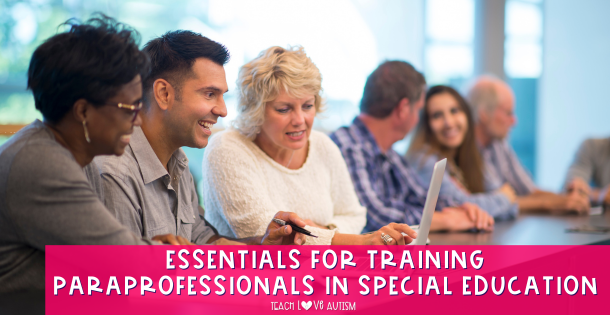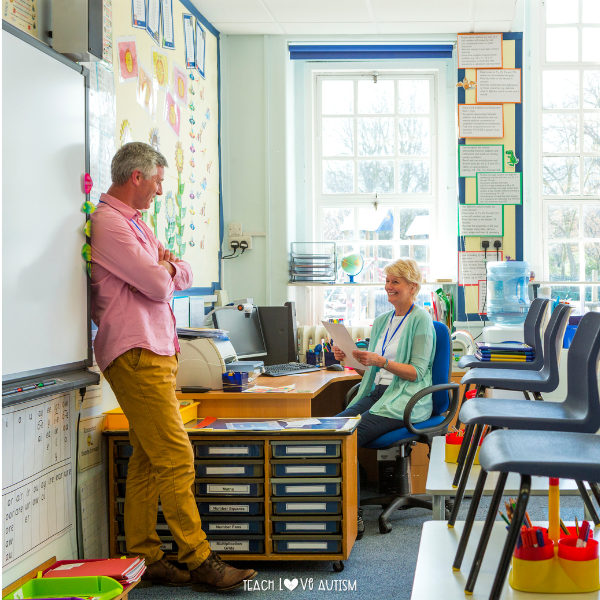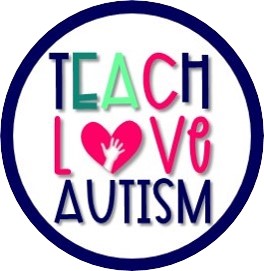8 Essential Tips for Training Paraprofessionals

Knowing tips for training paraprofessionals in special education settings to work with students is crucial for creating a supportive and effective learning environment. Many times schools do not take the time to properly prepare paraprofessionals for the jobs they are doing. Special education teachers often find themselves training, coaching, and providing support to them in order to better serve the needs of their students. This blog is meant to outline the key strategies and aspects of a proper training program for paraprofessionals.
Comprehensive Programs for Training Paraprofessionals
Why It’s Important: A comprehensive orientation program provides a solid foundation and understanding of school policies, student needs, and job expectations for new paraprofessionals. This should take place prior to the paraprofessional stepping into the classroom with students.
Strategies:
School Policies and Procedures: Include training paraprofessionals in special education on school policies, emergency protocols, confidentiality, and the specific needs of the student population. Ensuring that paraprofessionals are well-versed in these areas helps them navigate the school environment confidently and competently.
Introduction to Special Education: Cover the basics of special education, including common disabilities, teaching strategies, and individualized education plans (IEPs). This foundational knowledge enables paraprofessionals to understand and support the diverse needs of their students effectively.
Ongoing Professional Development for Paraprofessionals

Why It’s Important: Ongoing professional development ensures paraprofessionals remain updated with the latest educational strategies and behavioral interventions. An ideal way to provide this for paraprofessionals is to allow them to attend professional development on in-service days that are built into the school year. Some schools even provide paraprofessionals with continuing education credits by attending these types of sessions or workshops.
Strategies:
Workshops and Seminars: Offer regular workshops on behavior management, instructional techniques, and communication skills. These sessions provide valuable insights and practical strategies that paraprofessionals can apply in their daily interactions with students.
Online Courses and Webinars: Provide access to online learning resources focused on special education. This allows paraprofessionals to learn at their own pace and stay informed about new developments in the field.
Having a Mentor and Additional Support
Why It’s Important: Learning from experienced colleagues provides practical insights and emotional support, which are essential for new paraprofessionals. While many teachers are provided with mentors at their school to ask questions, seek advice, and gain insight, this is not common practice for paraprofessionals. It would be a great opportunity to growth and support.
Strategies:
Mentorship Programs: Pair new paraprofessionals with experienced ones for guidance and support. Mentorship helps new staff acclimate to their roles and gain confidence in their abilities.

Peer Support Groups: Organize regular meetings for training paraprofessionals in special education to discuss challenges, share experiences, and exchange strategies. These groups foster a sense of community and provide a platform for collaborative problem-solving.
Hands-on Training for Paraprofessionals
Why It’s Important: Practical experience is crucial for applying theoretical knowledge effectively in the classroom. However, many times paraprofessionals are just added into the mix of the classroom right away. This can be very overwhelming to any individual that is joining a classroom for the first time, and with special education procedures, behaviors, and more it really can make the stress levels high for a newly hired paraprofessional.
Strategies:
Classroom Shadowing: Allow new paraprofessionals to observe experienced teachers and paraprofessionals. This hands-on experience helps them learn best practices and understand classroom dynamics.
Role-Playing Scenarios: Use role-playing exercises to practice responding to common classroom situations and behavioral issues. This prepares paraprofessionals to handle real-life challenges with confidence.
Training Paraprofessionals with Clear Communication Channels
Why It’s Important: Clear communication channels ensure training paraprofessionals in special education can seek help, ask questions, and stay informed about student progress and classroom changes. This needs to come from multiple people in the school. Some of the key individuals are the classroom teacher, principal, and related service providers that work with the students in the classroom.
Strategies:
Regular Check-Ins: Schedule frequent one-on-one meetings to discuss experiences, provide feedback, and address concerns. Regular check-ins ensure that paraprofessionals feel supported and valued.
Communication Tools: Utilize email, messaging apps, and shared digital platforms for ongoing communication and coordination. These tools help maintain clear and efficient communication among the team.
Training Paraprofessionals on Specific Strategies to Support Special Education Students
Why It’s Important: Understanding the unique needs of each student allows paraprofessionals to provide tailored support. This is not something that happens in a snap. There needs to be a lot of time and effort put into learning about the students in the classroom. Then, knowledge of the IEPs, behavior plans, and implementation of the proper supports is necessary.
Strategies:
Individualized Education Plans (IEPs): Training paraprofessionals in special education on how to read and implement IEPs, including specific accommodations and modifications. This ensures that paraprofessionals can effectively support each student’s unique learning goals.
Behavioral Interventions: Provide training on effective behavioral interventions and strategies tailored to the students they will be working with. This equips paraprofessionals with the skills needed to manage a variety of behavioral challenges.
Looking for something to help with training your staff? Check out this binder with editable and printable options for you to use with your paraprofessionals right away!
Having Collaborative Planning During Staff Meetings

Why It’s Important: Collaborative planning ensures paraprofessionals are integrated into the instructional process and understand their role in supporting student learning. Many times the lines of communication are broken due to everyone being busy to meet students needs. That is why setting aside time in your classroom schedule for regular staff meetings can help to clear up any confusion.
Strategies:
Joint Lesson Planning and Meetings: Involve paraprofessionals in lesson planning sessions to ensure they understand the objectives and their role. This collaboration helps create a cohesive and supportive learning environment.
Feedback Loop: Establish a system for training paraprofessionals in special education to provide feedback on lesson plans and suggest modifications based on their observations. This encourages continuous improvement and ensures that lesson plans are effective and inclusive.
Providing Recognition and Postitive Reinforcement
Why It’s Important: Recognizing the efforts of paraprofessionals boosts morale and encourages professional growth. Typically there is a ton of information that we expect our staff to know about the classroom. And when your staff are doing what’s expected, supporting students correctly, and helping the day-to-day schedule run smoothly you really need to show your staff that they are appreciated for it.
Strategies:
Acknowledgment Programs: Implement programs to recognize and reward the contributions and achievements of paraprofessionals. Recognition programs help paraprofessionals feel valued and motivated.

Constructive Feedback: Provide regular, constructive feedback that highlights strengths and offers suggestions for improvement. This helps paraprofessionals grow professionally and feel supported in their roles.
Conclusion
Effective training of paraprofessionals in special education settings is essential for ensuring they are equipped to support students’ unique needs. Using these essential tips for training paraprofessionals will help your classroom run better. By implementing comprehensive orientation programs, ongoing professional development, mentorship, hands-on training, clear communication, focused training on specific needs, collaborative planning, and positive reinforcement, schools can foster a collaborative and effective team environment that benefits both students and staff.





